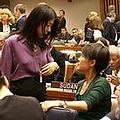 由於各國在自然資源和永續發展議題領域的落差,特別是能源和氣候變遷議題方面,導致聯合國永續發展委員會在經過兩週的協商過程之後,仍舊無法決議通過任何成果文件。
由於各國在自然資源和永續發展議題領域的落差,特別是能源和氣候變遷議題方面,導致聯合國永續發展委員會在經過兩週的協商過程之後,仍舊無法決議通過任何成果文件。
依據聯合國1992年6月在巴西里約熱內盧所通過的「21世紀議程」永續發展行動計劃,設立了永續發展委員會此一聯合國組織,其主要任務是在地方、國家、區域和國際層次落實21世紀議程。
但11日在聯合國總部所召開的第15屆委員會年會上各國卻顯現出分歧而非合作的態度。
狀況顯示,京都議定書是阻礙各國達成協議的主要原因之一。歐盟則持續強調,各國應儘速達成協議,以延續京都議定書體制,在2012年議定書到期後,仍然可以合法約束各國溫室氣體的排放量。另外,歐盟也大力推動各國針對再生能源發展目標設定具體時程,以及在2010年之前將能源政策整合到國家計劃之中
Fundamental differences between nations on the nature and scope of the sustainable development agenda, especially on the issues of energy and climate change, led to the failure of the UN Commission on Sustainable Development to approve any outcome document Friday after two weeks of negotiations.
The Commission on Sustainable Development is a UN body that emerged from Agenda 21, the program of action for sustainable development adopted in June 1992 at the Earth Summit in Rio de Janeiro. The Commission is tasked with encouraging international cooperation in the implementation of Agenda 21 at the local, national, regional and international levels.
But the 15th annual meeting of the Commission that ended at UN Headquarters on Friday demonstrated divisiveness, not cooperation.
The Kyoto climate protocol proved to be a major stumbling block to agreement. The European Union stressed the urgent need for an agreement that continues the Kyoto system of legally binding greenhouse gas emissions cuts past 2012 when the current protocol expires.
The European Union strongly supported time-bound targets for renewable energy and the integration of energy policies into national planning by 2010.
全文及圖片詳見 ENS報導



